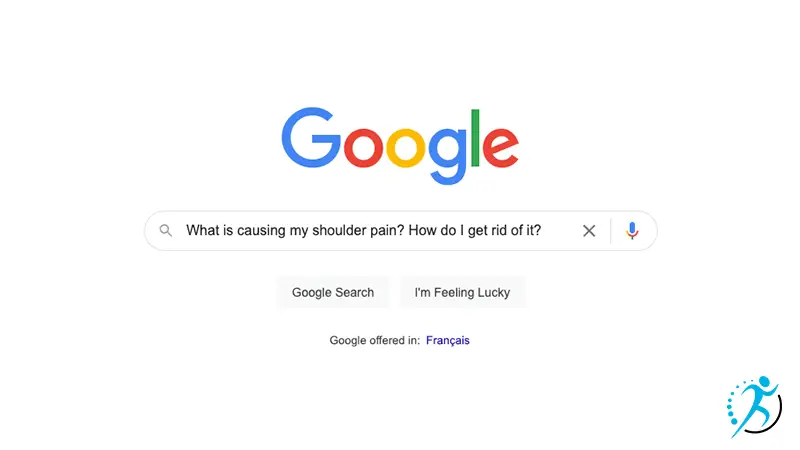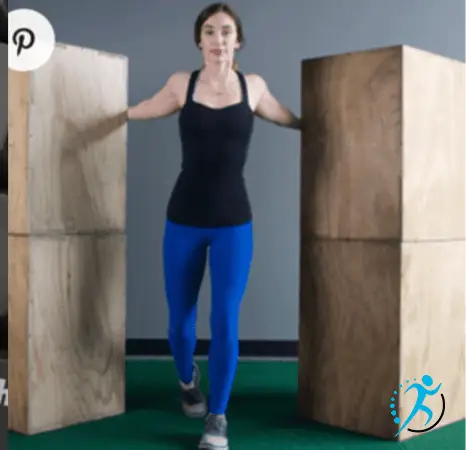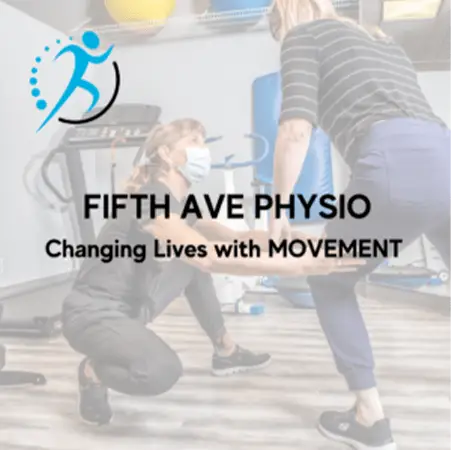
My Shoulder Hurts – Will a Google Search help to find a solution?
Thanks to the internet, we have more information at our fingertips than ever before.
Whatever your question, you can find an answer.
The most asked questions on Google are:
- What is my IP?
- What time is it?
- How to register to vote?
These are simple questions with simple answers.
But what if your questions are more complicated?

Will a google search help with a solution to these questions?
Things to keep in mind prior to googling your symptoms
1. Information Overload!
Access to the Internet has created new opportunities for patients seeking information.
Having so much information at our fingertips can be immediately helpful to educate us; however, there are situations where having access to so much information can be overwhelming and confusing.
Determining what information is evidence-based and accurate can be challenging. Without a solid understanding of physiology, anatomy, biology it’s difficult to understand what exercises are appropriate.
Shoulder pain is common.
The chance of developing shoulder pain over a lifetime may be as high as 66%.
Rotator cuff dysfunctions are the most prevalent cause of shoulder pain.
If you Google rotator cuff exercises, you will get just over 15 million hits.
Trying to manage your own health by taking it into your own hands to educate yourself is a great starting point but over 15 million choices!! Where do you even start?
There is valuable online content; however, the challenge becomes sorting between what is good advice and what advice is inaccurate.
For instance, if we go back to our rotator cuff exercise search, the first recommendation that comes up is to stretch the front of the shoulder with a doorway stretch.

Yes, this is true that the front of the shoulder often gets tight, but putting your shoulder in this position is usually very pain-provoking and may make symptoms worse.
What else does our Google search tell us we should do for our shoulder pain?
A lot! So many exercises – how do you pick and choose?
Do you pick the site that claims “top 3 rotator cuff exercises”?
That is a big claim for an exercise, assuming that you actually have a rotator cuff problem!
2. Googling Symptoms Causes Health Anxiety
If you Google “common causes of shoulder pain” you will get a lot of information using language like:
- rotator cuff tears
- shoulder impingement
- shoulder instability
- wear and tear
This language can be scary and may not be medically relevant. Our thoughts and beliefs about an injury influence how you move, how you cope, and how you respond to exercises.
When you are googling and diagnosing you may not know that MRI studies of adults with no shoulder pain show that 20% have partial rotator cuff tears and 15% have full-thickness tears.
You also may not know that we don’t use the term ‘wear and tear’ to describe injuries to joints or tendons anymore. Studies have shown that this language can cause increased stress, worry, fear of pain and movement, and resting too much.
There is even a term for it. The term “cyberchondria” describes the anxiety we experience as a result of excessive web searches about symptoms or diseases.
It’s not an official diagnosis but is an obvious play on the word “hypochondria”, now known as health anxiety. It’s obsessional worrying about health, online.
3. Misinformation
Anyone can publish content online. Nobody can vouch for the quality and credibility of the content available online. While it can provide you with information from credible sources, it can also get you links to some sketchy websites that have bogus information.
Content is often delivered in Internet search results that do not meet minimal standards for comprehensiveness, currency, validity, and reliability.
There are a lot of myths on the internet and information that is factually wrong. This is partly because research is ever-evolving and we continue to research and learn. You may be looking at old information and information that is coming from an uninformed source.
A googled diagnosis is usually wrong. Accordingly to a study from British Medical Journal, the correct diagnosis for a medical problem came up 34% of the time when someone googled their symptoms.
Shockingly, 80% of Internet users perceive Web health-related information as credible!
It is not uncommon for internet users to also share their complaints and experiences with peers using forums or social media and quickly find self remedies or participate in self-management programs.
Misinformation may lead you to attempt dangerous DIY versions of Physiotherapy.
4. The internet does not know your goals or potential
Do it yourself treatment!
If you do it alone and rely on the internet for your health resource, you may not reach your full potential.
A study that was done courtesy of Strive Labs revealed that less than 10% of people who could benefit from seeing a Physiotherapist were actually seeing one.
The good news is that most people with shoulder pain improve with physical therapy.
A Physiotherapist will motivate and push you to reach your goals and potential. A Physiotherapist will take the time to understand your beliefs, combined with a specific musculoskeletal evaluation to ensure that the best environment has been created for your success.
Interestingly the strongest predictor for not improving with treatment is the belief that you need surgery.
If you don’t believe you will improve with treatment – you most likely won’t!
5. Worsening of symptoms while you surf and wait
Symptoms may worsen. Shoulder pain is complex and may be coming from your neck instead of your shoulder. It is important to know what is causing the pain and get an accurate diagnosis.
Early Treatment is Best
The longer you wait for treatment the more sensitive your shoulder may become. Movement patterns may become protective and altered. Weakness from lack of use and altered mechanics can prolong your recovery.
Shoulder problems like bursitis, rotator cuff tears, or impingement syndrome can end up causing a frozen shoulder. The underlying condition may cause chronic inflammation and pain that make you use the shoulder less. This sets up a situation that can create a frozen shoulder.
Frozen shoulder (also called adhesive capsulitis) is a common disorder that causes pain, stiffness, and loss of normal range of motion in the shoulder. The resulting disability can take up 12 months or longer to improve.

6. Physiotherapists spend years in university
The article that Google spits out won’t know your personal presentation.
Determining a diagnosis and the correct exercises for your unique pain presentation involves a lot of clinical reasoning by your Therapist.
Questions your therapist is trying to answer when assessing your shoulder:
- Did you fall or did the pain start after a repetitive movement
- How painful and irritable is the shoulder
- Is your pain at rest or with movement
- What movements make the shoulder pain worse
- Is your shoulder stiff
- Is your shoulder weak
- Do you have muscle inhibition due to pain
- Is your neck involved
- What are your goals
- What is your present level of fitness
- And more………!!!
The more you remain actively involved in your health the better. Actively researching your condition is especially beneficial if you have a trusted expert resource like a Physiotherapist to help guide you through the information, challenge your beliefs and motivate you to do the “right” things to reach your goals.
We love it when you challenge us with lots of questions from information that you have read on the internet.
We will be happy to inform you that studies show that people who get Physiotherapy for a non-traumatic rotator cuff tear do just as well as those who have surgery.
So the next time you have shoulder pain, Google fifthavephysio.com and learn more about our team of Physiotherapists.
View this post on Instagram

Written by Kelly Barrie
Registered Physiotherapist BHScPT, FCAMPT, CGIMS
Kelly is the owner of Avenue Physio and is proud to be part of a supportive and personable team that is dedicated to providing a high quality of treatment and experience to patients. She has been a physiotherapist for over 25 years treating a range of orthopedic conditions including chronic pain, motor vehicle collisions, and sport injuries (from weekend warrior to high level). Kelly has always been passionate about movement and promoting healthy lifestyles. First, as a Certified Personal Trainer, and for the last 25 years as a physiotherapist. Kelly has completed the highest level of Certification in Manual and Manipulative Therapy that is internationally recognized (FCAMPT). Advanced knowledge of strengthening programs, manual therapy skills and critical thinking optimize her treatment plans for her patients so they can reach their movement goals.
References:
- Rotator Cuff Syndrome. Varacallo M, El Bitar Y, Mair SD.2021 Jul 18. In: StatPearls [Internet]. Treasure Island (FL): StatPearls Publishing; 2021 Jan.
- Asymptomatic Rotator Cuff Tears. Rebekah L. Lawrence, et al. JBJS Rev. 2019 Jun; 7(6): e9.
- Singh, K., Fox, J. R., & Brown, R. J. (2016). Health anxiety and Internet use: A thematic analysis. Cyberpsychology: Journal of Psychosocial Research on Cyberspace, 10(2), Article 4.
- Pribicevic M. The Epidemiology of Shoulder Pain: A Narrative Review of the Literature.
- In Pain in Perspective 2012. Kukkonen.
- Bone Joint J. 2014 Jan;96-B(1):75-81.
- Evaluation of symptom checkers for self-diagnosis and triage: audit study. BMJ2015;351:h3480
- https://meps.ahrq.gov/data_stats/tables





